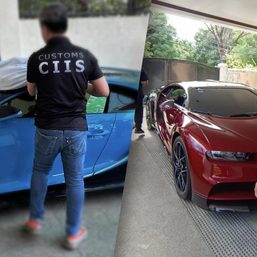SUMMARY
This is AI generated summarization, which may have errors. For context, always refer to the full article.
![[Vantage Point] The government is stifling shipping commerce](https://www.rappler.com/tachyon/2023/10/Govt-stifling-shipping-commerce-october-4-2023.jpg)
Ports are created to serve ships. Without ships, ports are nothing but empty structures.
What’s happening at the Bauan Port in Batangas is fit for a Ripley’s Believe It or Not! episode: ships are being forced to service the port.
Vantage Point learned that the shipping vessel MV Palma was denied berthing at the Bauan Port unless it pays a “facilitation fee” of P40,000. Actually, the cost had already risen by the hour because MV Palma was initially hesitant to fork out the amount, knowing fully well that what it was being asked was illegal. First, it was asked to shell out P20,000, then P30,000, and finally, P40,000.
The Batangas Port knew MV Palma’s vulnerability. The shipping agent is frantic because it urgently needed the vessel to dock, so it could load the cargoes the ship was supposed to transport. The ship was already subject to demurrage. You may think that the amount being asked is just a penny to most shipping companies. But if you calculate the number of ships docking at the port, you’d be appalled by the total amount that these ships are being illegally taxed.
On September 23 this year, MV Palma arrived at the Port of Bauan and immediately filed for berthing but was denied. Port officials were looking for the accreditations of the shipping company which owned the vessel, a practice not normally done in other ports in the world. For one, the ship has an accredited agent and has a permit to operate (PTO).
Worried that the ship would be stuck at the port, MV Palma filed for the authority to transact (ATT). On September 28, while waiting for approval, the ship was advised that it could dock using ATT for a fee of P600, as per Philippine Ports Authority Administrative Order (PPA AO) No. 09-2020, plus “facilitation fees” of P20,000 per ATT for a one-time use of three days.
On September 29, after agreeing to cough up P20,000 in “facilitation fees,” the port upped the “fee” to P30,000 before the ship could be allowed to dock. Now, the ship is being charged P40,000. PPA in Batangas reasoned out that what they are doing is “due course at this time,” whatever that means.
MV Palma has already lost millions of pesos for being docked for more than eight days and it leaks daily losses due to the delay in the approval of the ATT, which is supposed to cost the ship only P600 as per PPA AO No. 09-2020. Also under this AO, shipping lines and shipping companies are not required to secure a PTO.
PPA in the spotlight
This is not the first time that the PPA has been put on the spot. Its TOP-CRMS or the Trusted Operator Program-Container Registry and Monitoring System project was recently thumbed down by the Anti-Red Tape Authority (ARTA) which took cognizance of the vehement opposition from industry stakeholders.
PPA General Manager Jay Santiago has been aggressively pushing for TOP-CRMS by issuing in mid-2021 AO No. 04-2021, ostensibly to stop smuggling, “digitalize processes,” and “prevent port congestion.”
Under the scheme, Santiago proposes to install a digital tracking device on every container cargo to pinpoint its whereabouts at all times. That way, his reasoning goes, the diversion of container cargoes to another warehouse, a scheme importers employ to evade taxes, will be quickly and easily detected.
The problem is the collusion between Bureau of Customs (BOC) workers and smugglers, not the whereabouts of the containers and their contents. The BOC is already tracking down the movement of container cargoes.
It is the job of the BOC to go after smugglers and ensure that the government gets to collect the taxes due. It may have failed to carry out its mandate, but it is irrational to dump the problem on PPA’s lap. Industry stakeholders fear that the PPA general manager is merely stoking the fear of unrestricted entry of agricultural and manufactured goods as a convenient cover for yet another money-making scheme.
For one thing, PPA does not have such power and, worse, Santiago, who runs the agency, is not exactly loved even by his own employees.
Attention, Ombudsman!
PPA employees suspect Santiago’s motives. In a letter-complaint sent to the Office of the Ombudsman on October 21 last year, they alleged that the general manager overpriced the purchase of capital equipment by more than P300 million in three transactions.
In 2018, they claim, Santiago authorized the purchase of 12 units of Body Scanner Machines from Boston Home Inc. at a cost of P13,980,000 per unit, when the lowest of three bidders, Infinite System Technology Corp., had offered to supply the same machines at P192,000 each.
The same year, Santiago entered into a contract to purchase 25 units of Baggage X-Ray Machines from Defense Protection System Philippines at a cost of P7,595,520 per unit, when the lowest of the three bidders, Integrated Security & Automation, had offered to supply the same machines at just P2,593,152 per unit.
In another transaction, this time in 2019, he purchased 22 units of Seismic Accelerograph Machines from Filipino Technology Corp. at a cost of P4,858,865 per unit, when the lowest of the three bidders, Integrity One Global Tech., had offered to supply the same machines at only P1,450,000 per unit.
Duplication and red tape
AO 04-2021 stands on shaky legal ground. It imposes registration and monitoring fees on importers for every container, in addition to the insurance fees the importers are required to pay.
If implemented, TOR-CRMS will result in duplication, created another bureaucratic layer, increase the cost of doing business, and complicate an already chaotic situation.
Another issue Santiago raised is the vehicle traffic gridlock to and from the Port of Manila. Pray tell, how can a tracking device, sophisticated as it is advertised, widen pre-war narrow roads leading to the port?
Aside from usurping the BOC’s functions, Santiago is trying to pre-empt Congress. If there is need to introduce a new set of fees or modify existing ones, the power is vested in Congress, and that is exactly what House Bill No. 04933 and Senate Bill No. 0433 propose to do.
According to Santiago, the TOP-CRMS scheme will bring in more than P40.7 billion a year in government revenue. If that were true, industry experts say, the amount could only be realized at the expense of industry players, who would pass the additional cost of imported goods to consumers, which would in turn exacerbate inflation, which already stands at more than 8%.
Shiptek Solutions Corporation and Nextix Inc., the firms which entered into a joint venture (JV) for the PPA’s TOP-CRMS, had asked the Regional Trial Court in San Pedro, Laguna, to compel the port authority to push through with the program’s implementation. The petition was eventually dismissed by the court on July 14, prompting the contracting party to file a motion for reconsideration, which was received by the PPA on July 25.
In another court document dated August 11, 2023, that was filed by the Office of the Government Corporate Counsel, the defendant had asked the court to affirm the dismissal due to lack of jurisdiction and merit.
My thoughts on TOP-CRMS
Shipowners are inherently responsible for the tracking of containers, so they can reposition them for use in succeeding shipments by possible clients. Since these containers are the biggest source of revenue for them, shipowners are understandably concerned about the whereabouts of their respective containers.
The PPA wants to mandate all foreign shipping companies to adopt the TOP-CRMS program they designed, justifying that shippers will save 50% by paying only P5,000 per container. The claim is ridiculous, as they made a wrong comparison. There will be no savings at all because what the shipping companies are requiring is a P10,000 deposit that is refundable or chargeable to future transactions of each of their clients. They are comparing a deposit against a fee, so where would the savings come from?
The assumption of PPA officials that the proposed system is to be adopted only in Manila because more than 95% of containers are in Manila is false.
The proposed system will be a very big additional expense on the part of those concerned businessmen and the ultimate people who will suffer is “Juan Dela Cruz,” since all these expenses will eventually be added the price of the commodities that shipments would incur as they will be part of the cost of commodities when they reach the market. Many Filipinos are already experiencing tremendous problems with making ends meet and any price increase will further bore holes into their already flimsy pockets.
The program mandates that tagging of containers must be undertaken by Santiago’s approved contractor, Joey Ynion’s Group, who shall operate a container yard that use at least 10 hectares, located within a 50-kilometer radius from the Port of Manila. From what I understand, this yard will be located in Bulacan.
Just going to that place for the “tagging” of the container before it can be delivered to the consignee will be a big burden in terms of time spent and cost to be shouldered by the trucker who will then pass the burden on to their client – since the container will have to return to the container yard in Bulacan for the “untagging” prior to bringing the same to the port if loaded or back to a depository yard if empty. The domino effect of unnecessary costs will ultimately affect price of commodities that every one of us will have to absorb.
Every company covered by the proposed program will have to register; otherwise, their documents will not be processed. The thing is these businesses are already BOC-registered, so such a step is another layer of bureaucratic red tape. In this scenario, the Philippines will be the only country in the world interfering in the monitoring of containers and profiting from what is an inherent responsibility of shipowners that will only end up causing grief for majority of Filipino consumers.
Let’s not allow this to be another lamentable case of, “Only in the Philippines…” – Rappler.com
1 comment
How does this make you feel?






![[Vantage Point] BBM Year 2: Hits and misses](https://www.rappler.com/tachyon/2024/06/thought-leaders-marcos-hits-and-misses.jpg?resize=257%2C257&crop=277px%2C0px%2C720px%2C720px)


![[In This Economy] Part 2 | POGOnomics: Are we banning POGOs out of fear, outrage, not rational thought?](https://www.rappler.com/tachyon/2024/06/thought-leaders-pogonomics-part-2b.jpg?resize=257%2C257&crop=292px%2C0px%2C720px%2C720px)
Thanks to writer Val Villanueva for introducing the “internal workings” at the PPA to the reader. Without this article, the reader would not have any knowledge of the “possible” corrupt practices inside the PPA.